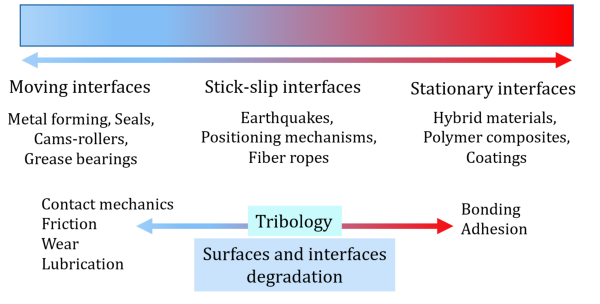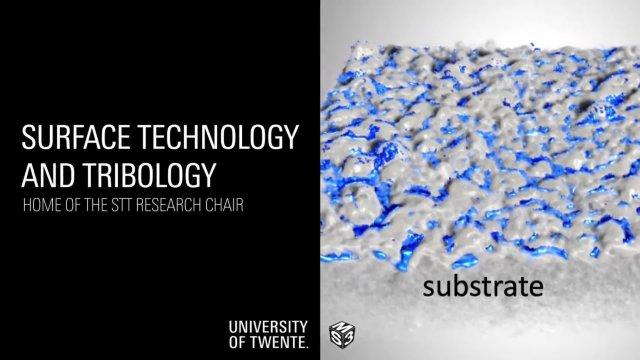Welcome
The research in the Surface Technology and Tribology group focuses around surfaces and interfaces in an engineering context, as well as degradation mechanisms taking place at these surfaces and interfaces. Surfaces and interfaces are typically complex, and in many cases critical components. A solid understanding, as well as accurate and validated models, of degradation phenomena at these surfaces and interfaces is important to develop efficient maintenance strategies.
Moving interfaces and tribology
Moving interfaces are very prominent in (mechanical) engineering. Phenomena taking place at these interfaces belong to the field of tribology. Typical tribological phenomena taking place at these interfaces are friction and the different wear mechanisms. In the case a lubricant is present, lubrication can be used to separate surfaces and avoid or reduce contact. The group focusses on modelling and experimental validation of tribological phenomena at interfaces.
Stationary interfaces and adhesive bonding
The second main type of interfaces are stationary interfaces, as are present in, for example, hybrid materials, like metal - polymer combinations. In this context, topics like bonding and adhesion are important and subject of research. Surfaces can be engineered to optimize bonding and hybrid materials can developed based on knowledge about the interfaces present in these materials.
Transitions between stationary and sliding interfaces
In many cases transitions from a stationary situation to a sliding situation is very important, Examples are highly accurate positioning mechanisms as well as, at a totally different length scale earthquakes. Transitions from stick to slip and vice versa are also subject of study in the research group, both in positioning mechanisms as well as in faults in the subsurface of the earth.
Degradation and maintenance
The reason behind the need for maintenance is the occurrence of degradation. Maintenance could therefore also be seen as counteracting degradation and should be monitored and performed based on knowledge about the underlying degradation mechanisms. Ultimately, maintenance will elongate the usable life of machines and installations and is very important in the transition to an efficient circular economy. A solid scientific understanding of the cause behind maintenance, the occurrence of degradation, is a prerequisite for smart maintenance strategies.

The Surface technology and Tribology group works with the Tribology Lab with different experimental and test facelities.
The Surface technology and Tribology group together with the Tribology based maintenance group also coordinates and leads the SKF University Technology Centre for Grease Lubrication:

